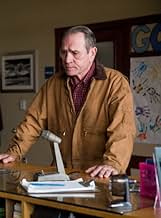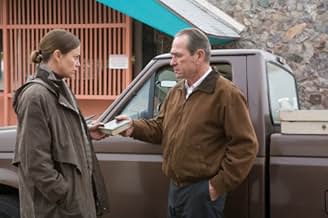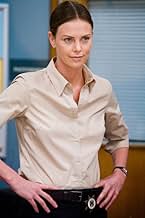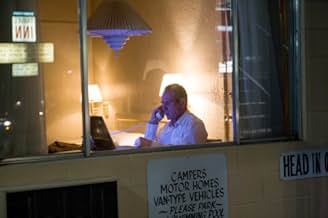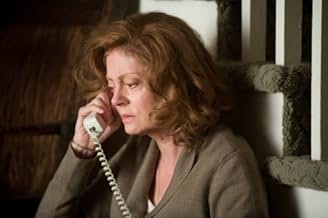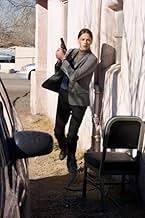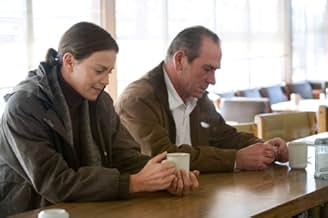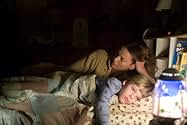CALIFICACIÓN DE IMDb
7.1/10
77 k
TU CALIFICACIÓN
Un investigador militar jubilado trabaja con un detective de policía para descubrir la verdad tras la desaparición de su hijo después de que regresara de la guerra de Iraq.Un investigador militar jubilado trabaja con un detective de policía para descubrir la verdad tras la desaparición de su hijo después de que regresara de la guerra de Iraq.Un investigador militar jubilado trabaja con un detective de policía para descubrir la verdad tras la desaparición de su hijo después de que regresara de la guerra de Iraq.
- Dirección
- Guionistas
- Elenco
- Nominado a 1 premio Óscar
- 3 premios ganados y 21 nominaciones en total
Roman Arabia
- Private Robert Ortiez
- (as Victor Wolf)
Greg Serano
- Detective Manny Nunez
- (as Greg Serrano)
Opiniones destacadas
The big movies about the Vietnam war -- Apocalypse Now, Deer Hunter, Full Metal Jacket -- didn't reach the screen until about five years after the war ended. But movies dealing with Iraq and terrorism are cropping up all over even as this war still rages.
What exactly that means is hard to know, but it would seem to indicate that no matter which side of the issue they come down on, the filmmakers are willing to risk alienating about half the potential audience in an America more polarized today than at any point in our history.
"In the Valley of Elah" treads lightly on the politics for most of the movie, concentrating on the unfolding mystery of what happened to a young soldier who vanishes shortly after returning from a tour of duty in Iraq. Looking for answers are his father, a former sergeant in the Army's Criminal Investigation Division, and a young female civilian detective, who gets involved in the case, gets bounced off in a jurisdictional dispute, but winds up back on the case when its determined the crime took place off military property.
While director Paul Haggis gets uniformly good performances out of all the characters, the movie belongs to Tommy Lee Jones as the grieving father and Charlize Theron as the determined detective. Both turn in outstanding performances. Jones shines, playing a man who has spent his life holding in his emotions and can't change now, even as his world falls apart. Theron radiates strength as a woman trying to survive in a sexist police department where all her male colleagues are certain she slept her way into her detective's job. That is somewhat important to the story, because the movie provides a look into the lower class white community that provides the bulk of the recruits in the all volunteer army.
None of this really deals with the politics of the war, though, and it is not until the very end of the film that politics come into play, and even there, it is handled with great care. The message is more about the kind of war America finds itself fighting today and what that type of combat does to the men who engage in it. Unlike world wars one and two, Vietnam and Iraq are not wars between easily recognized enemies. We are not battling the Germans or the Japanese. In both Nam and Iraq, Americans find it is difficult to tell friend from foe. That means they often must make snap decisions that sometimes determine whether they themselves live or die. Needless to say, their decisions also determine the fate of the people in the sights of their weapons..
"In the Valley of Elah" does an excellent job of showing that post traumatic stress syndrome is not an oddity, but rather a growing problem in an army of young men whose job requires them to be quick on the trigger.
Every American should see this movie and then think long and hard about it.
What exactly that means is hard to know, but it would seem to indicate that no matter which side of the issue they come down on, the filmmakers are willing to risk alienating about half the potential audience in an America more polarized today than at any point in our history.
"In the Valley of Elah" treads lightly on the politics for most of the movie, concentrating on the unfolding mystery of what happened to a young soldier who vanishes shortly after returning from a tour of duty in Iraq. Looking for answers are his father, a former sergeant in the Army's Criminal Investigation Division, and a young female civilian detective, who gets involved in the case, gets bounced off in a jurisdictional dispute, but winds up back on the case when its determined the crime took place off military property.
While director Paul Haggis gets uniformly good performances out of all the characters, the movie belongs to Tommy Lee Jones as the grieving father and Charlize Theron as the determined detective. Both turn in outstanding performances. Jones shines, playing a man who has spent his life holding in his emotions and can't change now, even as his world falls apart. Theron radiates strength as a woman trying to survive in a sexist police department where all her male colleagues are certain she slept her way into her detective's job. That is somewhat important to the story, because the movie provides a look into the lower class white community that provides the bulk of the recruits in the all volunteer army.
None of this really deals with the politics of the war, though, and it is not until the very end of the film that politics come into play, and even there, it is handled with great care. The message is more about the kind of war America finds itself fighting today and what that type of combat does to the men who engage in it. Unlike world wars one and two, Vietnam and Iraq are not wars between easily recognized enemies. We are not battling the Germans or the Japanese. In both Nam and Iraq, Americans find it is difficult to tell friend from foe. That means they often must make snap decisions that sometimes determine whether they themselves live or die. Needless to say, their decisions also determine the fate of the people in the sights of their weapons..
"In the Valley of Elah" does an excellent job of showing that post traumatic stress syndrome is not an oddity, but rather a growing problem in an army of young men whose job requires them to be quick on the trigger.
Every American should see this movie and then think long and hard about it.
I just saw this film and consider it to be one of the best anti-war films I've seen in quite a long time. And that makes me wonder at what the various critics are thinking. Roger Ebert gets it right, but some film critics are far too dismissive of a very serious, important film. James Berardinelli, in particular, seems curiously _angry_ that this film depicts the moral degradation of war in a frank and honest fashion.
Berardinelli is basically wrong in every single thing he says about the film. Since this film is not a "politcal message" film, it has no requirement to "show both sides equally". It is a story about a group of soldiers basically driven beyond the area of traditionally human behavior. Berardinelli thinks that it's "obvious" that war changes the way people feel about their country.
I sense a person utterly detached from history when I read that. A recent study concluded that the English were, as a group, fairly happy during WWII, even when their nation was under attack. Why was that? Because they believed in what they were doing. The notion that war _necessarily_ results in moral breakdown is, while hardly novel, also not true. That is part of what is important about "Elah". Jones' character is a veteran of the Vietnam war, and is hardly a delicate flower when it comes to the matters of war and its effect on the psyche. And yet even he is floored at what the Iraq war has done to the soldiers.
It is easy for a film critic to simply reject what is essentially reporting on the state of the military today. That Berardinelli does so with such vitriol makes me guess that he is injecting his own bias into the review.
Berardinelli is basically wrong in every single thing he says about the film. Since this film is not a "politcal message" film, it has no requirement to "show both sides equally". It is a story about a group of soldiers basically driven beyond the area of traditionally human behavior. Berardinelli thinks that it's "obvious" that war changes the way people feel about their country.
I sense a person utterly detached from history when I read that. A recent study concluded that the English were, as a group, fairly happy during WWII, even when their nation was under attack. Why was that? Because they believed in what they were doing. The notion that war _necessarily_ results in moral breakdown is, while hardly novel, also not true. That is part of what is important about "Elah". Jones' character is a veteran of the Vietnam war, and is hardly a delicate flower when it comes to the matters of war and its effect on the psyche. And yet even he is floored at what the Iraq war has done to the soldiers.
It is easy for a film critic to simply reject what is essentially reporting on the state of the military today. That Berardinelli does so with such vitriol makes me guess that he is injecting his own bias into the review.
Only Roger Ebert and the reviewer for Rolling Stone seem to see the truth here: this film is slow and elegiac because it deals with heavy matters, but it is never boring, not if you understand the situation and the depth of feelings being explored. It's as if reviewers don't get it because they didn't really feel what the film is saying. Saying that there have been dozens of films about how war ruins men so it's a cliché, and that this one is too dreary and slow means that a person has stopped feeling for what is really hurtful, is even in denial. And that's the theme of this film: what happens when we lose touch with what's painful and don't care any more. The film is restrained but powerful, which is why it has such a strong effect.
Jones is wonderfully grim, with a face like a road map, as he explores what happened to his son. Charlize Theron is beautiful even though she is playing a woman who is forced to act as non-sexy as possible to get on in her job in a male police force. Susan Sarandon is not, as some critic said, "underused"; she gives a performance that is all the more powerful because it is restrained. This movie should be a must see for all who believe that the Iraq war should continue until there is an honorable time for America to leave. That time is already passed.
Jones is wonderfully grim, with a face like a road map, as he explores what happened to his son. Charlize Theron is beautiful even though she is playing a woman who is forced to act as non-sexy as possible to get on in her job in a male police force. Susan Sarandon is not, as some critic said, "underused"; she gives a performance that is all the more powerful because it is restrained. This movie should be a must see for all who believe that the Iraq war should continue until there is an honorable time for America to leave. That time is already passed.
This movie deals with the serious business of war and what it does to people.
It also deals with the anguish of parents, and how they try to deal with loss. When all is gone and there seems no point carrying on.
As well as this there is the military and how it deals with its image and the fragility of the men it must use.
The ex military father tries to find the truth behind his sons death. Despite him feeling he could do a better job than the police. Even he is caught out by the truth.
The movie is slow, and serious, and even disturbing at times. However, it always keeps you interested, and is a good watch; if you are in the right mood for it.
It also deals with the anguish of parents, and how they try to deal with loss. When all is gone and there seems no point carrying on.
As well as this there is the military and how it deals with its image and the fragility of the men it must use.
The ex military father tries to find the truth behind his sons death. Despite him feeling he could do a better job than the police. Even he is caught out by the truth.
The movie is slow, and serious, and even disturbing at times. However, it always keeps you interested, and is a good watch; if you are in the right mood for it.
'War is hell' but perhaps it is the postwar that is most telling. At least that is the thesis of Paul Haggis' latest film, In the Valley of Elah, a story of a father's quest for his son that reveals some bitter truths about war. Not an easy film to swallow upfront, it is certainly one of the best films of the year.
A grizzled, former military policeman, Hank Deerfield (Tommy Lee Jones), is notified that his son, Mike, is AWOL after returning from the fighting in Iraq. What begins as a methodical search for his son's whereabouts becomes more tragic and clashes with local police and military brass. Where is his son, and what do his soldier buddies know about one fateful night near their base? And what if anything did happen to him in Iraq? These questions are answered in small pieces and with alarming implications. Hank's skills at police work help convince local Detective Emily Sanders (Charlize Theron) to take charge of the case despite the doubts of her own colleagues and the military, led by investigator Lt. Kirklander (Jason Patric). Mike's PDA has garbled video that begins to paint a disturbing picture of the war front. Hank's search takes an emotional toll on himself and his wife (Susan Sarandon). He and Emily form an uneasy alliance, and, amid theories and suspects, what emerges is an ominous portrait of war veterans on the homefront. Ultimately Hank comes face to face with a disarming truth about his son's fate and the possible involvement of his military brethren.
The story is based on actual events in 2001 in Tennessee, and its title references the mythic tale of David and Goliath set at a time when the rules of engagement were different than the present. Its sparse, simplistic structure of a mystery peppered with flashback video and imagery may seem on surface like an independent film, but its message and execution is on a grander scale and not merely with dialogue. With effective visuals, much is conveyed by silence, expression, or simple body language.
As with other Haggis films, things that seem ordinary and insignificant at the beginning have implications later on. Though not as overtly obvious with connecting a myriad of dots as in his Oscar winner Crash, the threads are all there to gradually weave together. It is refreshing that the jurisdictional conflict between local police and the military does not take a stereotypic turn of heavy handed conspiracy and cover-up even though the military investigators are not cast in the best light. It shares a similar feel with the recent Courage Under Fire where the truth is unearthed in small bits until a bigger picture emerges. A couple of minor plot points go nowhere such as Hank meeting an old comrade who may have connections with military intelligence.
As grandiose and flamboyant as was his Oscarwinning turn in The Fugitive, Tommy Lee Jones' acting here is equally underplayed; he is magnificent. Through the pain and guilt that creep over his lined features, you also feel his suffering, his loss, and understand his bitterness. His Hank is a proud man, a patriot, who wants the truth. The truth ultimately changes him forever. Equally up to the challenge is Theron, in a strong performance, whose detective is a single mother who must battle her own squad and superiors while trying to solve a mystery. Even Sarandon's brief moments are affecting as the long distance wife. The rest of the cast is very good; they become real people.
This is not simply the readjustment to the homefront done magnificently in The Best Years of Our Lives or the heavy use of dramatic love triangle to condemn the Vietnam War in Coming Home. Rather, it takes the concept of a given war and allows it to become the ultimate villain in an increasingly sordid mystery. Its ending calls to mind The Deer Hunter but with a more pessimistic bent. It most certainly vilifies the effects of war on its men.
It is significant that a passing quote, "We all do stupid things," says something about not just the horror of warfare, but what such conflict does to its soldiers, and how they become soulless monsters capable of the most brutal of crimes. This is a brave, imperfect film that sets a somber tone and never lets up. The final image is a statement that makes this perhaps the subtlest of antiwar films ever. Oscar nominations can start here with picture, direction, screenplay, and the duo of Jones and Theron. While not everyone will be willing to let the story unfold with its nuanced direction and understated acting, those who are patient will find a moving tale of innocence lost and corrupted.
A grizzled, former military policeman, Hank Deerfield (Tommy Lee Jones), is notified that his son, Mike, is AWOL after returning from the fighting in Iraq. What begins as a methodical search for his son's whereabouts becomes more tragic and clashes with local police and military brass. Where is his son, and what do his soldier buddies know about one fateful night near their base? And what if anything did happen to him in Iraq? These questions are answered in small pieces and with alarming implications. Hank's skills at police work help convince local Detective Emily Sanders (Charlize Theron) to take charge of the case despite the doubts of her own colleagues and the military, led by investigator Lt. Kirklander (Jason Patric). Mike's PDA has garbled video that begins to paint a disturbing picture of the war front. Hank's search takes an emotional toll on himself and his wife (Susan Sarandon). He and Emily form an uneasy alliance, and, amid theories and suspects, what emerges is an ominous portrait of war veterans on the homefront. Ultimately Hank comes face to face with a disarming truth about his son's fate and the possible involvement of his military brethren.
The story is based on actual events in 2001 in Tennessee, and its title references the mythic tale of David and Goliath set at a time when the rules of engagement were different than the present. Its sparse, simplistic structure of a mystery peppered with flashback video and imagery may seem on surface like an independent film, but its message and execution is on a grander scale and not merely with dialogue. With effective visuals, much is conveyed by silence, expression, or simple body language.
As with other Haggis films, things that seem ordinary and insignificant at the beginning have implications later on. Though not as overtly obvious with connecting a myriad of dots as in his Oscar winner Crash, the threads are all there to gradually weave together. It is refreshing that the jurisdictional conflict between local police and the military does not take a stereotypic turn of heavy handed conspiracy and cover-up even though the military investigators are not cast in the best light. It shares a similar feel with the recent Courage Under Fire where the truth is unearthed in small bits until a bigger picture emerges. A couple of minor plot points go nowhere such as Hank meeting an old comrade who may have connections with military intelligence.
As grandiose and flamboyant as was his Oscarwinning turn in The Fugitive, Tommy Lee Jones' acting here is equally underplayed; he is magnificent. Through the pain and guilt that creep over his lined features, you also feel his suffering, his loss, and understand his bitterness. His Hank is a proud man, a patriot, who wants the truth. The truth ultimately changes him forever. Equally up to the challenge is Theron, in a strong performance, whose detective is a single mother who must battle her own squad and superiors while trying to solve a mystery. Even Sarandon's brief moments are affecting as the long distance wife. The rest of the cast is very good; they become real people.
This is not simply the readjustment to the homefront done magnificently in The Best Years of Our Lives or the heavy use of dramatic love triangle to condemn the Vietnam War in Coming Home. Rather, it takes the concept of a given war and allows it to become the ultimate villain in an increasingly sordid mystery. Its ending calls to mind The Deer Hunter but with a more pessimistic bent. It most certainly vilifies the effects of war on its men.
It is significant that a passing quote, "We all do stupid things," says something about not just the horror of warfare, but what such conflict does to its soldiers, and how they become soulless monsters capable of the most brutal of crimes. This is a brave, imperfect film that sets a somber tone and never lets up. The final image is a statement that makes this perhaps the subtlest of antiwar films ever. Oscar nominations can start here with picture, direction, screenplay, and the duo of Jones and Theron. While not everyone will be willing to let the story unfold with its nuanced direction and understated acting, those who are patient will find a moving tale of innocence lost and corrupted.
¿Sabías que…?
- TriviaThis film was originally a potential starring vehicle for Clint Eastwood, who directed Paul Haggis' screenplay for Golpes del destino (2004). Eastwood turned it down, despite liking the script very much, and recommended his friend Tommy Lee Jones for the role of Hank Deerfield.
- ErroresThe opening subtitle says that the Deerfields live in "Munro, Tennessee", but the address on the side of Hank's truck says "Munroe, Tennessee".
- Citas
Chief Buchwald: But didn't you just say that you would do whatever you were told?
Det. Emily Sanders: Yeah, I sometimes exaggerate for effect.
- Bandas sonorasShu44le
Written by Robin Davey and Jesse Davey
Performed by The Davey Brothers
Courtesy of The Davey Brothers
Selecciones populares
Inicia sesión para calificar y agrega a la lista de videos para obtener recomendaciones personalizadas
- How long is In the Valley of Elah?Con tecnología de Alexa
Detalles
- Fecha de lanzamiento
- País de origen
- Sitios oficiales
- Idioma
- También se conoce como
- In the Valley of Elah
- Locaciones de filmación
- Productoras
- Ver más créditos de la compañía en IMDbPro
Taquilla
- Presupuesto
- USD 22,000,000 (estimado)
- Total en EE. UU. y Canadá
- USD 6,777,741
- Fin de semana de estreno en EE. UU. y Canadá
- USD 133,557
- 16 sep 2007
- Total a nivel mundial
- USD 29,541,790
- Tiempo de ejecución2 horas 1 minuto
- Color
- Mezcla de sonido
- Relación de aspecto
- 2.35 : 1
Contribuir a esta página
Sugiere una edición o agrega el contenido que falta

Principales brechas de datos
What is the streaming release date of En el valle de las sombras (2007) in Canada?
Responda






